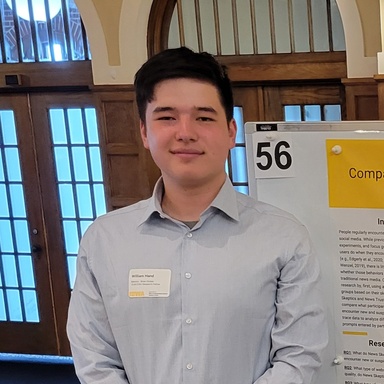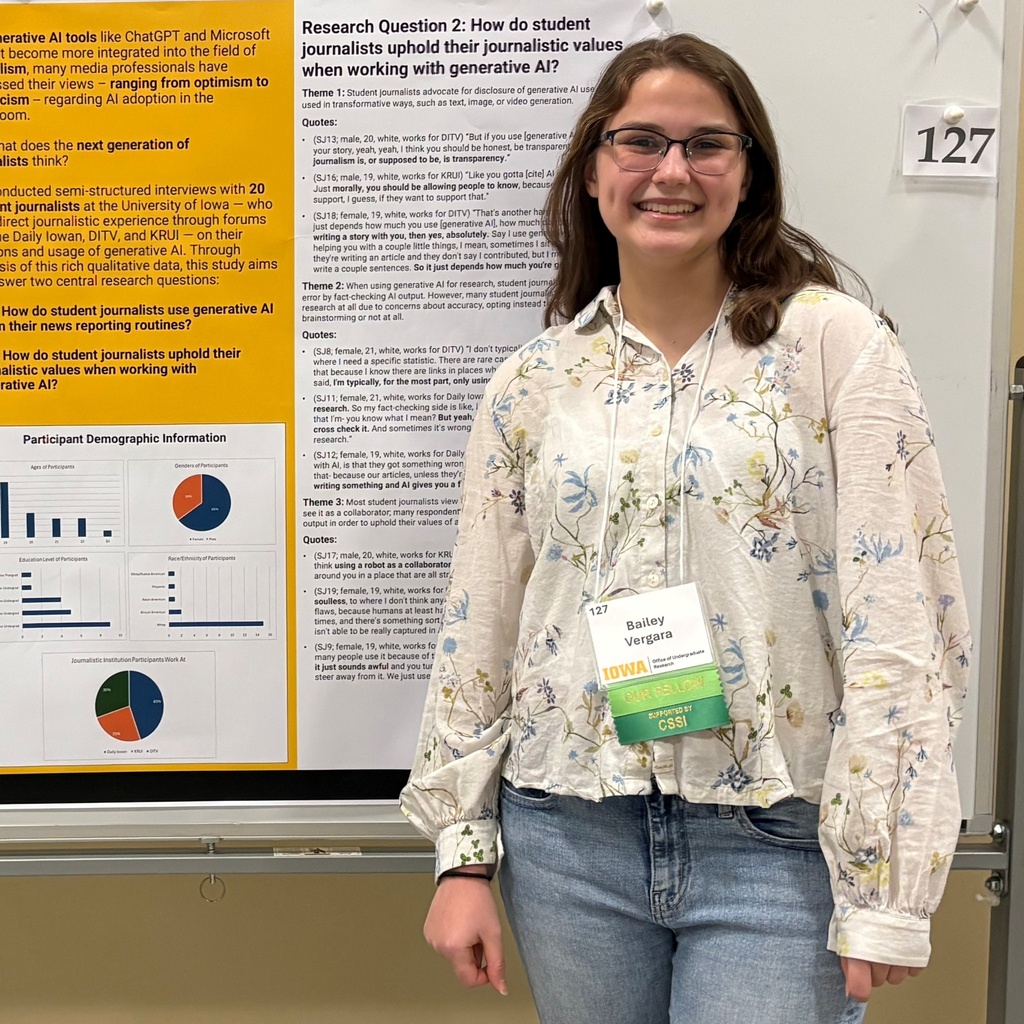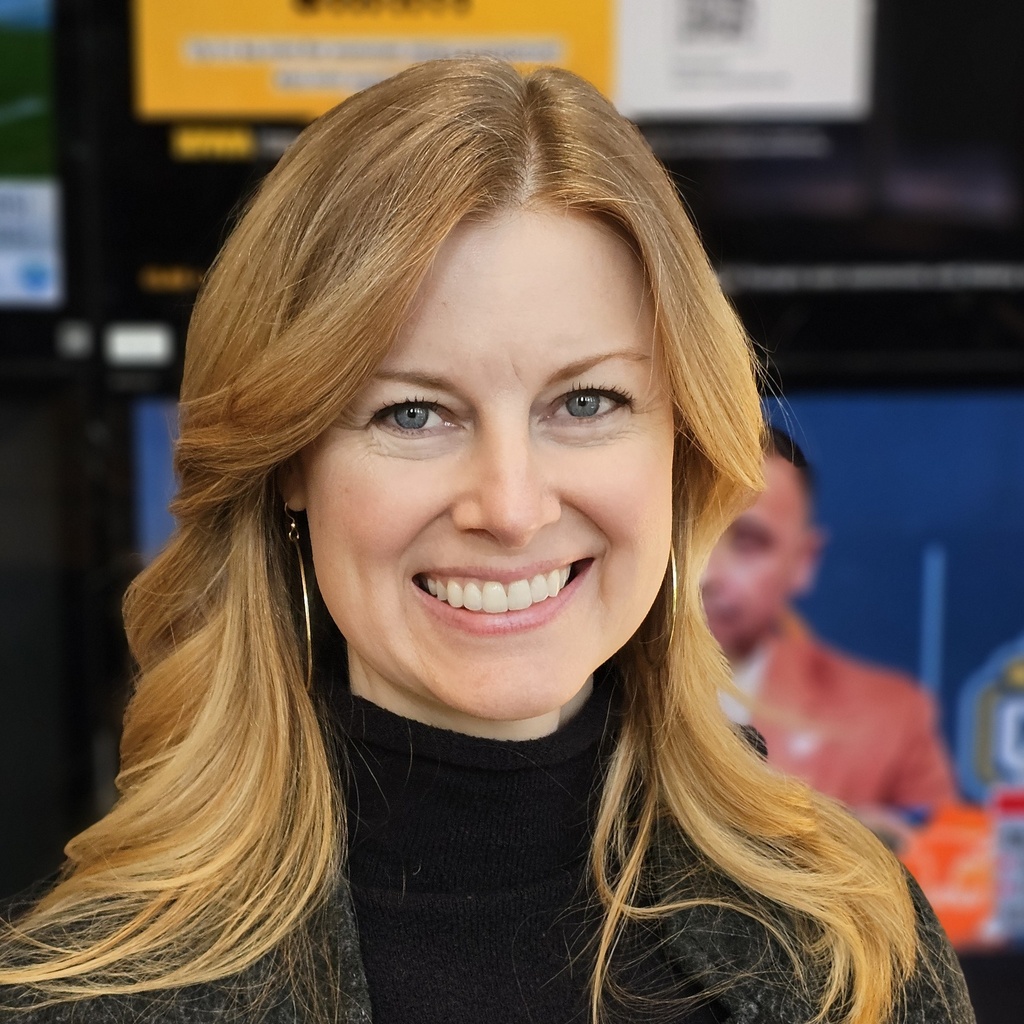Main navigation
Why Research?
Deepen your understanding.
As an undergraduate, diving into research allows you to deepen your understanding of complex issues and fuel your intellectual curiosity. Students in the School of Journalism and Mass Communication work side-by-side with faculty experts who are shaping the future of media research.
While traditional research opportunities are often associated with STEM fields, students in the humanities and social sciences gain equally valuable skills by participating in cutting-edge projects that integrate coursework with real-world applications. Whether you're exploring career paths or preparing for graduate school, research experiences strengthen your professional portfolio and pave the way for future academic and career success.

"I was intrigued by Dr. Ekdale's research on the relationship between political extremism and social media behavior after reading a Center for Social Science Innovation spotlight."
1 in 3
SCRIPT Requirement:
Courses designated as Undergraduate Research by the University of Iowa and administered by the School of Journalism and Mass Communication will fulfill the SCRIPT experiential learning requirement for students in the major. URES courses administered by the Office of Undergraduate Research may also be used by JMC majors to fulfill the SCRIPT requirement for research activities mentored by faculty outside the School of Journalism and Mass Communication (e.g. second area of study).
What does research look like?
The School of Journalism and Mass Communication is a hub of cutting-edge research and creative work. Our faculty bring their expertise into the classrooms and learning labs to give students direct, hands-on experience to contribute to renowned research efforts. Undergraduate students interested in learning more about research activities in our program should review the following research areas of strength.
Digital Media
Digital media research examines the many ways contemporary life is experienced on and through digital and social media. This broad area of research includes studies of emerging technologies, media effects, platform studies, self-expression and meaning-making, digital campaigns by activists and organizations, mis/disinformation and information-sharing, and more.
Global Media
Global media scholarship focuses on the production, distribution, and consumption of media in comparative international contexts. It encompasses a wide range of traditional and contemporary theories involving international media flows and counterflows, development communication, media and social change, cultural hybridity, and transnational popular culture.
Political Communication
Political Communication research examines the interactions among governments, media institutions, and societal actors in shaping decision-making processes, public opinion, and civic engagement. Scholars in this field investigate technology-mediated phenomena such as democratization, globalization, and political crises, employing methodological approaches ranging from qualitative content analysis to computational techniques.
Health Communication
Health communication examines how health information contributes to the beliefs, behaviors, policies, and practices that promote health and well-being for individuals and the public. As an interdisciplinary field, health communication includes studies within the media effects tradition; health promotion efforts within public health; and critical studies that analyze health representation and stigma.
Sports Media
Sports media research considers the deep and symbiotic relationship between commercialized media and commercialized sports in the United States and globally. It centers power and cultural struggle, seeking to better understand the institutional histories that have shaped sports media, and how dominant ideas about identity, institutions, and other cultural arrangements are justified, naturalized, and sometimes challenged in sports media.
Journalism Studies
Journalism studies is concerned with the study of news and information within its historical, social, cultural, and epistemological contexts. It draws from the fields of sociology, media studies, and technology studies to study journalism as a practice, a cultural form, and an institution. It both embraces the vital importance of journalism in democratic society while interrogating many of the professional and normative assumptions that dominate journalism practice.
navigating the algorithm: active learning in political communication
To complement traditional instructional methods, we designed and implemented a semester-long final project focused on directly observing YouTube algorithmic recommendations within an experimental setting in our undergraduate political communication course. (JMC:3118 Political Communication)
What are my course options?
Undergraduate students are encouraged to register for a course when they participate in research activities to ensure they receive credit or transcript recognition for their efforts. The following courses are designated as Undergraduate Research by the University of Iowa and fulfill the SCRIPT experiential learning requirement for students in the major.
Stand Alone
An academic course taught by faculty where students learn practical research skills and methodologies in the classroom. Simulated research activities are embedded directly into course assignments.
Independent Study
An independent research project conducted under the supervision of a faculty mentor outside the classroom. Students may either propose their own creative project (student-driven) or assist faculty with an ongoing research project (faculty-driven). Students must adhere to CLAS independent study policies.
| Course # | Title | Type | Hours | Graded |
|---|---|---|---|---|
| JMC:3118 | Political Communication | Stand Alone | 3 | A-F |
| JMC:3510 | Media and Marketing Research | Stand Alone | 3 | A-F |
| JMC:4920 | Undergraduate Research | Independent Study | 0-3 | S-U |
| JMC:4955 | Honors Project | Independent Study | 3 | A-F |
| SPST:4999 | Honors Project | Independent Study | 1-3 | A-F |
| URES:399X* | Undergraduate Research and Creative Projects | Independent Study | 0-4 | Variable |
| * URES:399X courses are administered by the Office of Undergraduate Research and can be used by JMC majors to fulfill the SCRIPT requirement for research mentored by faculty outside the School of Journalism and Mass Communication (e.g. second area of study). | ||||
Faculty Research
Our faculty are shaping the future of integrative media research.
Enrolling in an Independent Study
Step 1. Identify a research opportunity
Review the School of Journalism and Mass Communication's Research and Creative Work to determine where your interests align with faculty research. We recommend contacting potential faculty mentors the semester prior to registering for a research course. Communicating with professors directly is the most effective means of identifying opportunities, but keep in mind that faculty may not be able to accommodate an undergraduate researcher.
Step 2. Complete an Independent Study Contract
Complete an Independent Study Contract in collaboration with your faculty mentor. This contract serves as a mentor/mentee agreement and outlines the expectations and research activities required to successfully complete the course. Email the completed form to the Experiential Learning Specialist to receive permission to register.
Step 3: Register on MyUI
Initiate an add request on MyUI to register for the course during the same academic term as the research experience. Follow university registration deadlines. Credit cannot be awarded retroactively.
Determining Semester Hours
1-3 credit option
For independent study courses that offer a range of credit options, students may self-select the number of semester hours to enroll in. Prior to registration, students and faculty mentors should agree upon an appropriate number of semester hours to be earned. See credit guidelines in Frequently Asked Questions.
0 credit option
Students have the option to register for 0 s.h. if they don’t need the additional credit to meet graduation requirements. Registering for 0 s.h. provides transcript documentation for research activities and fulfills the SCRIPT experiential learning requirement. Students should register for 0 s.h. if they:
- Are being paid in a research position
- Are volunteering in a research position
- Do not want to accrue tuition and fees
Frequently Asked Questions
What are typical research tasks for an undergraduate student?
Tasks that an undergraduate researcher in journalism and mass communication might perform include:
- Literature searches. Reviewing existing research and academic papers relevant to the project.
- Coding or content analysis. Analyzing media content to understand patterns, themes, and biases.
- Identifying interview participants. Recruiting and organizing focus group interviews.
- Transcribing interviews. Converting audio or video recordings into written text.
- Editing manuscripts. Proofreading the content of the research and verifying citation style.
How much time am I expected to work on a research project?
The workload may vary from week to week depending on the stage of the research project. For example, some weeks may only require reviewing articles, while the days leading up to a conference deadline tend to be more intense. The best approach is to talk with your faculty mentor ahead of time to set expectations and negotiate a manageable workload. In general, 3 hours of research per week equals 1 s.h. of credit earned.
What are the credit guidelines for an independent study course?
Credit hours earned for an independent study must meet the UI credit hour guidelines. Generally, 1 s.h. of credit is equal to approximately 3 hours of research activities per week.
| Credit earned | Hours of participation |
|---|---|
| 0 s.h. | 3 hrs research per week |
| 1 s.h. | 3 hrs research per week |
| 2 s.h. | 6 hrs research per week |
| 3 s.h. | 9+ hrs research per week |
Can I receive academic credit and payment for the same research experience?
No. Students cannot receive both academic credit and payment for their participation in research. Those who are being paid for their participation in research (e.g. a paid research assistant) must register for 0 s.h. to document their experience.
What are URES courses?
Independent study courses with a prefix of URES are administered by the Office of Undergraduate Research (OUR). OUR Independent Study Courses are open to students in any major to document their research experience. URES courses serve to fill gaps in departments that don't have a program-specific undergraduate research course.
Independent study courses in JMC are restricted to JMC majors conducting research with faculty in the School of Journalism and Mass Communication. There are situations where a JMC major might want to conduct research with faculty in a different department (e.g. their second area of study)--registering for a URES course allows the JMC student to document their participation in research and also satisfy the SCRIPT experiential learning requirement.
What course should I register for if I want to graduate with honors?
Students who plan to graduate with Honors in journalism and mass communication are required to register for JMC:4955 to document their research or creative project.
Is there an outlet to present my research findings?
Yes! All students involved in mentored research or creative work are invited to present their work at the Fall and Spring Undergraduate Research Festivals (FURF and SURF). Students may utilize posters or other visual displays to showcase their contribution to research. More information on the events and poster design resources can be found at:
What if I need to drop the research course?
If you terminate your research project early and/or need to drop an independent study course, you must initiate the change request on MyUI and follow university course deadline dates. If such a request is made after the drop deadline without authorization from your academic advisor, you will receive an unsatisfactory grade.
Can I enroll in a course after I've completed my research project?
No. You must register for the course during the same academic term as your research experience and follow university registration deadlines. Compensation will not be awarded retroactively.
Want to earn money?
The Center for Social Science Innovation offers employment opportunities for students to gain experience in basic research methodologies, study requirements, best-practices, and data collection.
attitudes and beliefs regarding generative ai usage in newsrooms among college journalism students

Bailey Vergara
Within the past decade, generative AI has cemented itself as a watershed development in the realm of modern journalism. Media professionals have expressed both hope and concern towards potential generative AI integration in the newsroom. However, the existing research on perceptions of generative AI news mainly centers on professional journalists, with very little focus on the perspectives of journalism students. These students are the journalists of the future, whose views on generative AI will inevitably shape how it is seen and used within the field in years to come. This study aims to be among the first to examine the attitudes and beliefs of college journalism students in regards to generative AI’s place in the newsroom. Twenty semi-structured interviews were conducted with student journalists working with institutions within the University of Iowa, including the Daily Iowan, DITV, and KRUI, allowing us to identify the major factors that may play a role in student journalists’ decisions whether or not to adopt generative AI into their news reporting routines. This research will provide media professionals with in-depth insights into how future journalists might handle generative AI-related issues in the newsroom, thus laying a foundation for a possible framework to guide emerging journalists in their usage of generative AI.
Faculty Mentors: Bingbing Zhang, Yasar Onel
Who can help me?

Tamara Ewoldt
tamara-ewoldt@uiowa.edu
W113 Adler Journalism Building

Financial Support
Office of Undergraduate Research
The Office of Undergraduate Research offers student financial awards, including $2500-$3000 fellowships, travel funds, supply grants, and reimbursement for poster printing. More information can be found at https://our.research.uiowa.edu/students2/compensation-your-research
College of Liberal Arts and Sciences
The College of Liberal Arts and Sciences is committed to promoting opportunities for faculty and students to collaborate in research. Opportunities for faculty members to support undergraduate students working with them on research projects can be found at https://clas.uiowa.edu/research/undergraduate-funding
Hawkeye Experience Grant
The Hawkeye Experience Grant awards stipends in variable amounts up to $4000 for undergraduate students who are involved in applied learning experiences outside of the classroom. More information can be found on the Pomerantz Career Center website.
